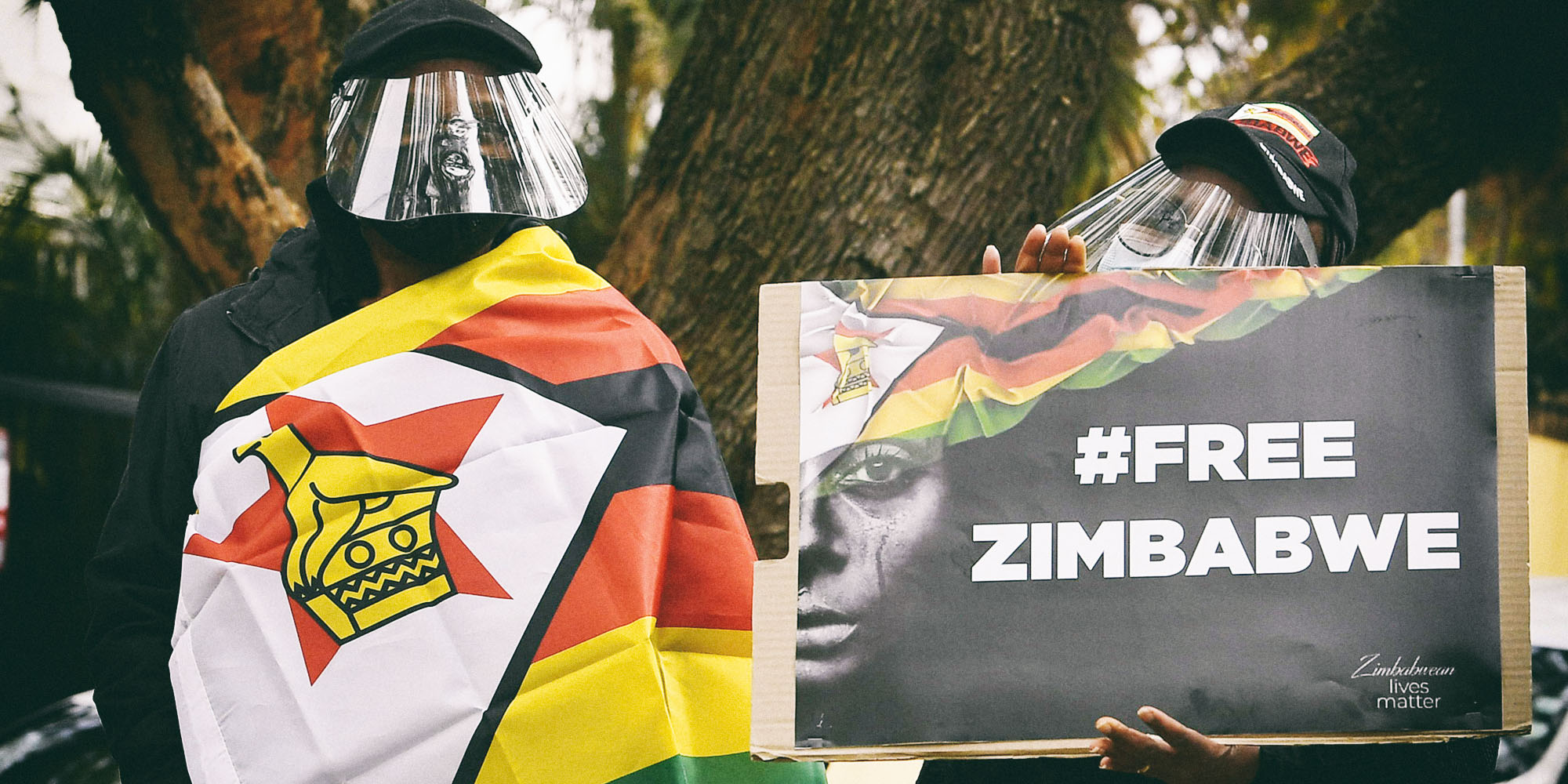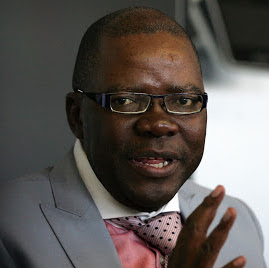News
Fixing Zimbabwe Requires South African Honesty About Itself
The imposition of a curfew and massive deployment of the military have amplified the Harare regime's paranoia and insecurity. Will South Africa finally act?

Three years after the departure of Robert Mugabe as President, Zimbabwe finds itself in familiar territory: A vortex of repression as a consequence of interwoven crises of leadership, legitimacy and socio-economic decline. The last month has seen the indiscriminate arrest, abductions and torture of activists, lawyers and journalists. The imposition of a curfew and massive deployment of the military have amplified the Harare regime's paranoia and insecurity. And yet it may be a defining moment for a country that has remained in a permanent state of crises for much of the last 40 years.
Into this environment step South Africa's special envoys, Sydney Mufamadi and Baleka Mbete. Can they help to put Zimbabwe at last onto a different path to stability and prosperity?
Three scenarios are currently imaginable in Zimbabwe: that the current situation continues, in which only continued decline is foreseeable; that there is a change of leadership within ZANU-PF, which on current form is unlikely to improve matters; and lastly, of a MDC-ZANU transitional government, which enables an arrangement to a different future.
Only the last offers any hope for an economic recovery.
In the absence of internal champions, and a ZANU regime that observes no restraints in preserving its grip on power, achieving this more positive scenario requires external facilitation.
South Africa, as the regional hegemon, seems to have realised this responsibility with the appointment of its two envoys. But for this intervention to be successful in stabilising Zimbabwe, this will have to occur in a manner not unlike South Africa's own transition, and like Pretoria managed with Harare after the abortive election in 2008, though preferably in a more even-handed fashion. And it will in so doing have to admit the very essence of the systematic governance failure of liberation movements across the southern African region in the tendencies of impunity, entitlement and a zero-sum economic mentality.
If South Africa can do so successfully in Zimbabwe, there is hope for South Africa itself in addressing its own rapid decline into failure.
Today every Zimbabwean indicator is bleak. Zimbabwe's continued dysfunction is a blight on the southern African region, an illustration of the limits of South African power, and evidence of how politics continues to trump economic common sense. It is an example of the rampant and corrosive effect of state capture, a lesson that South African reformers know only too well.
Currently the southern African region resembles increasingly an arc of crisis, of low (or no) growth, simmering political unrest, and growing international disinterest. The biggest challenge is to convince the elites to open up their economies to share beyond their narrow coterie, to give substance to the term 'inclusive growth'.
We need to contemplate the cost of the alternative: If Zimbabwe further implodes, beyond a point we've seen before, it will become ever more difficult for South Africa to stand for prosperity in isolation in the region. One only has to look at the effect of the Syrian crisis on its neighbouring countries to realise that South Africa cannot wait for the worst to happen in Zimbabwe.
Paradoxically Zimbabwe's potential to positively influence the region is huge. Imagine the impact of the flow of traffic across Beit Bridge free from the interference of malevolent customs officials, or the boom in regional investment if its two biggest economies were to fire on all cylinders? The change in investor perception, too, of a South Africa getting to grips with longstanding regional problems can only invigorate confidence.
To achieve this, South Africa will fundamentally have to stop playing domestic politics with Zimbabwe and avoid seeing the process through a domestic political party prism. For example, it needs to avoid the calculation, which it has made continuously with Zimbabwe, of the threat to its own integrity from ZANU's demise. Rather the situation needs to be viewed from within a different lens, of the realisation of the cost that ZANU's prototypical brand of state capture poses to the region.
It is in South Africa's direct national interest that the Zimbabwe crisis is resolved. If the country can get back on a growth footing, rebounding to the ten percent annual GDP growth it necessitates for social stability, this can add as much as half a percentage point of growth to the South African economy.
These sort of growth rates are imaginable, and possible. Let's not forget that during Zimbabwe's Government of National Unity between 2009 and 2013, the economy grew at an average of 13% between 2009 and 2013, per capita incomes rising to nearly $1,100.
Three different areas of action are necessary to get Zimbabwe onto a positive path.
At its core, this requires resolution of the political impasse between the ruling ZANU-PF and the opposition Movement for Democratic Change.
The second action concerns the need for a concerted economic stabilization programme led by internal Zimbabwean government action. This would have to end the current folly of multiple local currencies which fuel inflation through so-called Zollarisation and instead pursue macro-stabilisation through re-Dollarisation or, preferably, Randisation.

The latter move would likely bring added advantages to greater liquidity, not least inflows from the South African Reserve Bank. Fiscal reform would have to match this initiative, including the ending of the practices of fuel subsidies, without which any positive path out of the mire would quickly, as now, be destabilised as the elites sought to reset only to retain a predatory role.
Harare would also have pursue a series of micro-reform actions to boost the productive sector, especially in farming, including the instatement of lease arrangements to enable commercial borrowing against land title.
And thirdly, with political change and led by domestic economic policy reforms, the international community can engage, committing resources to revitalizing specific Zimbabwean sectors by donor: power and other infrastructure, civil service reform, the military, health, and education among them. But this is not possible without political change, and that much is unlikely without external facilitation. Without a new political compact, outsiders would only be throwing good money after bad.
Political change is the key, and only, mechanism to ensure firm commitments to recovery projects. Certainly greater volumes of aid, currently at $500 million and much of it focused on humanitarian needs, is necessary to get the country back on its feet. This can only come from the international community, as President Mnangagwa himself has admitted. 'Isolation,' he said at his 2018 inauguration, 'has never been splendid or viable, solidarity and partnerships are will always be the way.'
Convincing Zimbabwe's elite to let go of their leeching ways is one challenge that will demand a measure of carrot and stick. Keeping it so will require some imaginative thinking. This could, for example, centre around a series of public hearings which lay bare the cost of corruption to the population, Zimbabwe's own Truth Commission.
There are as many as six million Zimbabweans in the diaspora. Perhaps two-thirds of these live in South Africa. This is an incontrovertible metric of the effect of malfeasant governance and bad policy. Conversely, changing direction offers the prospect of growth inside and out, drawing some of these skills and energies back into the country, putting it and southern Africa onto a different trajectory, just as it once did at independence in 1980.
Biti is a former Minister of Finance of Zimbabwe; Mills directs the Brenthurst Foundation. Together they are co-authors of Democracy Works: Rewiring Politics to Africa's Advantage.
Picture: The authors Tendai Biti and Greg Mills



